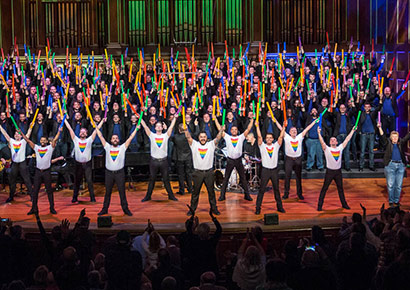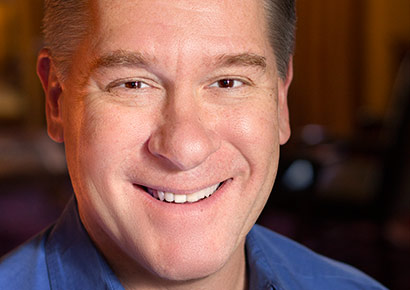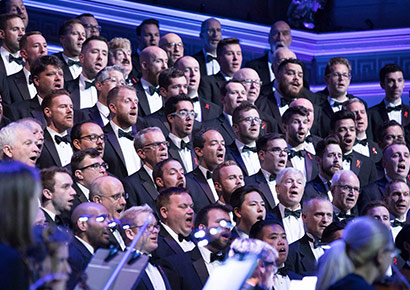Boston Gay Men’s Chorus | Planting seeds of change through music

Gretjen Helene Photography
The Boston Gay Men’s Chorus made headlines in 2015 with their historic performances in the Middle East. Now they are coming to South Africa this June.
The chorus is the first openly gay international choir to tour the country. Consisting of 93 singers, each member has paid their way to perform in South Africa with the aim of creating musical experiences to inspire change, build community, and celebrate difference.
Founded in 1982, the 175-voice ensemble is known for its musicianship, creative programming and community outreach. The Boston Gay Men’s Chorus sings a wide spectrum of classical and popular music and and provides a positive, affirming image of the gay and lesbian community. The chorus is heard live by more than 10,000 people each season and thousands more through recordings and television and internet broadcasts.
During their visit, they will hold five concerts; in Soweto, Johannesburg (Wits), George, Langa and Parow in Cape Town. The shows are non-profit and funds raised will go toward various organisations and charities.
Mambaonline spoke to Reuben M. Reynolds III, music director of the Boston Gay Men’s Chorus (BGMC), ahead of the South African tour.
Why are gay choirs such a phenomenon?
Choral music for male voices is a tradition that goes back centuries. And you’re right, they are everywhere, including South Africa. We can’t wait to share the stage at the Soweto Theatre in Johannesburg on June 15 with the Mzansi Gay Choir, which formed in 2015. Many of the US-based gay choruses formed in the early 1980s as a way to build community and find a safe and welcoming place to be gay. This was during the early years of the AIDS crisis which had a significant impact on the community and the chorus. In those early years, there was widespread discrimination in society and some members did not want to have their names printed in our programs.
How widespread are these groups?
There are now gay choruses around the world: England, Europe, Australia and New Zealand, Germany, and Mexico. Of course, we were thrilled to learn that the Czech Republic, which we visited on our 2005 Eastern European tour, now has its own gay men’s chorus. We are incredibly proud to be part of the worldwide family of gay men’s choruses and this wonderful tradition of making music to entertain and inspire positive change, which only continues to grow.

Reuben M. Reynolds III
How can a choir, like the Boston Gay Men’s Chorus, make a difference in the world and within the LGBTQ community?
Music is a transformative part of building bridges and community. It has the power to transcend boundaries and create connection among people from different backgrounds, languages and beliefs, and has long been a central part of social justice movements. We’re not a political organisation, but we use music to transform prejudice, mistrust and fear into curiosity, acceptance and understanding. In 2005 we became the first gay chorus to perform in Poland. In 2015 we became the first gay chorus to perform in the Middle East. We were met with protest, but by expressing our lives through song, we created musical experiences that not only changes hearts and minds, but inspired audience members to get up and dance. Today we have fans around the world. Our videos are watched nearly 3,000 times per day from 228 countries, and at home we perform outreach concerts schools and community centers. The money that is raised from our outreach performances is donated to local lesbian, gay, bisexual, and transgender organisations.
In what way does the BGMC stand out from other gay choirs?
We are one of the largest gay male choruses in the United States. We’ve won numerous artistic awards. In 2015, we sang at the Inaugural Celebration of Massachusetts Governor Charlie Baker, becoming the first gay chorus nationally to perform at a Republican gubernatorial celebration. As we leave for South Africa we’ll be representing Boston Mayor Marty Walsh as the headline entertainment for the US Conference of Mayors. From our earliest years, we’ve taken our music to places where it’s never been heard before. We sing for audiences puzzled by our insistence on identifying as not just “singers,” but “gay singers.” We perform for lesbian, gay, bisexual, and transgender people for whom our concert is their first experience of an LGBT cultural event.
This is the first BGMC tour to Africa. Why did you choose South Africa specifically?
South Africa is a country of rich musical and choral traditions so we’re very excited to honor those traditions. Because protest songs were an integral part of the anti-apartheid movement, South Africans believe deeply, as we do, in the transformative power of music and its use as a tool to effect social change. We’re also keen to provide a different view of America and what it stands for than what has been presented to the world over the last year-and-a-half. We know that by raising awareness and funds for LGBT people in South Africa and elsewhere, we are making the world a better place.
What is the BGMC aiming to achieve here?
We are looking forward to learning more about South African culture and cuisine, and trying some bobotie, biltong, and malva pudding. We are especially proud to be partnering with local organisations in Cape Town and Johannesburg that serve LGBT South Africans, LGBT refugees, and people living with HIV. We will be donating proceeds from our concerts to these organisations. We’re going to participate in the first-ever Pride Parade in George, and are honored that we’ll also be visiting with and performing for people in Kliptown. We’re also going to visit Robben Island and the Apartheid Museum. But most of all, we cannot wait to get to perform for you!
How would your describe your members? Is there a common trait amongst the men who join the choir?
Well, the common trait is a love of music and singing. But otherwise, our members come from all walks of life. Our youngest member is 19-years-old and our oldest is in his seventies. Our members reflect the world. They belong to all races, most are gay, some are transgender and we even have some straight men performing with us.

Gretjen Helene Photography
What’s informed the selection of songs that you’ll perform? What kind of music can we expect?
The main thing audiences can expect is to have fun! Our performances are joyful and inspiring and will make you smile. Our concerts will feature music from Broadway to the movies; from folk and spirituals to pop. We have a group of songs about the gay experience including A Love That Will Never Grow Old from the film Brokeback Mountain. When we spoke with all of the local tour presenters about our concerts and asked what South African audiences would like to hear, everyone said Africa by Toto! So we’re going to sing that. But we’re also going to sing some traditional South African and African songs like Baba Yetu and Tshotsholoza. We’ll also have dancers for some numbers. We can’t wait!
What are the issues that you’ll be highlighting in your South African tour?
We’ll be exploring the commonality between our two countries, including the ongoing struggle for racial and social justice. We’ll also be addressing how music lifts up the spirit and brings us together as people, despite a separation of 8,000 miles (13,000 kms).
What did you learn as a choir from your Middle East and Eastern Europe tour?
We learned that by sharing stories of our lives through music, particularly in places such as Wroclaw, Poland, Ein Gedi, Jerusalem, and Istanbul, where it is relatively unusual to see artistic expressions of the LGBT experience and where we performed to sold out enthusiastic houses, we are planting seeds of change, not only in our audience but in ourselves.
The Boston Gay Men’s Chorus will perform the following concerts in South Africa:
• Friday 15 June, at the Soweto Theatre, Soweto
All proceeds will go toward the Kliptown Youth Project
• Saturday 16 June, at the Great Hall, Wits University, Johannesburg
All proceeds will benefit GALA (Gay and Lesbian Memory in Action)
• Tuesday 19 June, at Pienaar St, George
• Thursday 21 June, at the Johnson Ngwevela Hall, Langa, Cape Town
All proceeds will benefit PASSOP (People Against Suffering, Oppression and Poverty)
• Friday 22 June, at the Hugo Lambrechts Music Centre, Parow, Cape Town
All proceeds will go toward Triangle Project
Tickets are available via Webtickets.
Leave a Reply